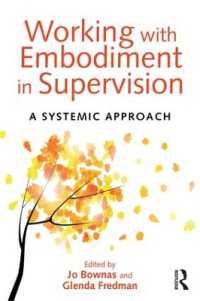- ホーム
- > 洋書
- > 英文書
- > History / World
基本説明
This unique collection focuses on the unexamined connections between two contemporary, intensively debated lines of inquiry: Hegel-inspired theories of recognition (Anerkennung) and analytical social ontology.
Full Description
This unique collection focuses on the unexamined connections between two contemporary, intensively debated lines of inquiry: Hegel-inspired theories of recognition (Anerkennung) and analytical social ontology. These lines address the roots of human sociality from different conceptual perspectives and have complementary strengths, variously stressing the social constitution of persons in interpersonal relations and the emergence of social and institutional reality through collective intentionality. In this book leading theorists and younger scholars offer original analyses of the connections and suggest new ways in which theories of recognition and current approaches in analytical social ontology can enrich one another.
Contents
1. Heikki Ikäheimo & Arto Laitinen
Recognition and Social Ontology
Recognition and the Social Ontology of Personhood
2. Robert B. Brandom
The Structure of Desire and Recognition: Self-Consciousness and Self-Constitution
3. Robert B. Pippin
On Hegel's Claim that Self-Consciousness is "Desire Itself" ("Begierde überhaupt") Pirmin Stekeler-Weithofer
Intuition, Understanding, and the Human Form of Life
Hegel, Marx, and Beyond: Recognition, Spirit and Species Being
5. Ludwig Siep
Mutual Recognition: Hegel and Beyond
6. Heikki Ikäheimo
Holism and Normative Essentialism in Hegel's Social Ontology
7. Paul Redding
The Relevance of Hegel's "Absolute Spirit" to Social Normativity
8. Michael Quante
Recognition as the Social Grammar of Species Being in Marx
Groups, Institutions and Recognition
9. Margaret Gilbert
Mutual Recognition and Some Related Phenomena
10. Italo Testa
Social Space and the Ontology of Recognition
11. Arto Laitinen
Recognition, Acknowledgement, and Acceptance
12. Titus Stahl
Institutional Power, Collective Acceptance, and Recognition
13. Vincent Descombes
The Problem of Collective Identity: The Instituting We and the Instituted We
Notes






